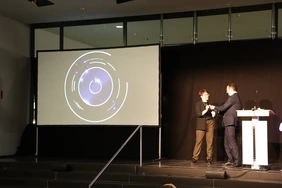What might the future look like - and how can we prepare for different scenarios? Research is being conducted at Technische Hochschule Ingolstadt (THI) to answer these questions. On Friday, 11 November, the ceremonial founding of the Bavarian Foresight Institute (BayForesight) took place there.
BayForesight focuses on technology-oriented foresight and the associated economic and social interdependencies. In view of the rapid developments in the economy, technology and society, future competence is becoming increasingly important. BayForesight will place a special focus on the topics of artificial intelligence, sustainability and mobility and cooperate with universities throughout Bavaria. The transfer of research results and consulting for business and society are further tasks of the new institute.
At the opening ceremony, THI President Prof. Dr. Walter Schober emphasised the overarching ambition of the new THI Institute: "BayForesight should take a bird's eye view, not only of developments in business and society, but also of research at THI: What technologies and trends are coming - and what does that mean for us as THI?"
State Secretary Roland Weigert said in a digital greeting: "Especially in view of the challenges of our time, it is existentially important to successfully shape the transformation processes and develop new business and organisational models. For this, a synergetic interplay of future and technology research, strategy development and innovation capability is crucial. I look forward to innovative ideas and exciting impulses from the new institute. The funds from the High-Tech Agenda Bavaria will be excellently invested here."
Prof. Dr. Jan Oliver Schwarz, Professor of Strategic Foresight and Trend Analysis and head of the new institute, explained the basic approach of futurology as follows: "To deal with the future first means to critically examine the present. From this analysis, we in BayForesight want to provide and democratise future competencies."
Keynote speaker Stephan Mergenthaler (Head of Strategic Intelligence and Member of the Executive Committee of World Economic Forum) emphasised: "Against the backdrop of the global political crisis and the experience of the pandemic, foresight must also prepare for disruptive developments and strengthen resilience." Mergenthaler presented principles for a constructive transformation agenda that should be anchored socially and entrepreneurially by BayForesight.
In addition to Institute Director Prof. Schwarz, Prof. Dr. Laura Bechthold (Technology Assessment and Cultural Management), Prof. Dr. Alexander Schönmann (Technology Design and Application) and Prof. Dr. Stefanie Wrobel (Business Development and Transformation Management) conduct research in BayForesight. They all teach in the Master's programme Global Foresight and Technology Management, which has been training a national and international student audience to become the next generation of futurologists, strategy developers and change managers since the winter semester 2021/22.


![[Translate to English:] Logo Akkreditierungsrat: Systemakkreditiert](/fileadmin/_processed_/2/8/csm_AR-Siegel_Systemakkreditierung_bc4ea3377d.webp)








![[Translate to English:] Logo IHK Ausbildungsbetrieb 2023](/fileadmin/_processed_/6/0/csm_IHK_Ausbildungsbetrieb_digital_2023_6850f47537.webp)


